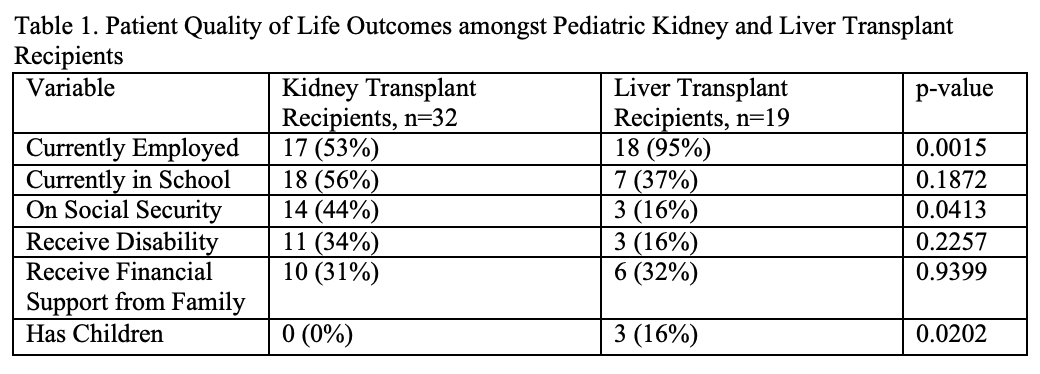Nephrology
Session: Nephrology 2
16 - Barriers and Facilitators of Transitioning Pediatric Transplant Recipients to Adulthood
Saturday, May 4, 2024
3:30 PM - 6:00 PM ET
Poster Number: 16
Publication Number: 16.1268
Publication Number: 16.1268

Kristen Mascarenhas, BS (she/her/hers)
Medical Student
University of Miami Leonard M. Miller School of Medicine
Miami, Florida, United States
Presenting Author(s)
Background: The transition to adulthood among pediatric solid organ transplant recipients presents many challenges, both physically and psychosocially. Over 80% of pediatric patients survive into adolescence and young adulthood, yet there is limited literature assessing the quality of life of these patients.
Objective: The purpose of this study is to identify barriers and facilitators of successful transition to adulthood for this patient population are critical to better understanding factors and developing interventions that can contribute to improved quality of life.
Design/Methods: In this ambispective study, chart review was completed retrospectively for 262 adults who received a solid organ transplant during childhood. 144 kidney, 92 liver, and 21 cardiac transplant recipient charts were reviewed. Prospectively, 55 patients consented to complete a questionnaire regarding their lives post-transplant, 52 of whom also completed a standardized quality of life questionnaire (29 kidney, 19 liver, and 4 cardiac patients). Cardiac patients were removed from analysis due to limited sample size. Quality of life outcomes were compared between the kidney and liver transplant recipients.
Results: There were no significant differences across 16 quality of life measures amongst kidney and liver transplant recipients, with average responses ranging from “Mixed” to “Pleased”. Significant differences regarding life post-transplant included higher levels of employment (p = 0.0015) and likelihood of having children (p = 0.0202) among liver transplant recipients, while more kidney transplant recipients were receiving social security (p = 0.0413).
Conclusion(s): Assessment of quality of life measures can help elucidate areas of intervention to ensure more successful transitions to adulthood amongst pediatric solid organ transplant recipients. Employment opportunities and family planning should be prioritized for kidney transplant recipients transitioning to adulthood.

